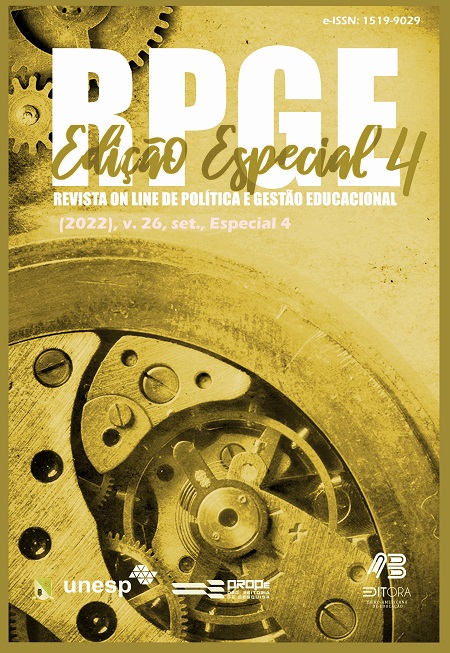Teaching art in the curriculum of basic education in the current context
Contradictions and challenges
DOI:
https://doi.org/10.22633/rpge.v26iesp.4.17132Keywords:
Basic education, Art teaching, BNCCAbstract
In the present article, we approach Art Education in Basic Education in Brazil, from two points of view: the education of the educator and the understanding of art used in official documents, and, then, we defend a formation in the field of the arts of the teachers of basic education, indispensable to the teaching work and the integral formation of children and adolescents. Supported by critical thinkers, we discussed the National Curricular Common Base (BNCC), regarding the sensitive dimension and the discourse of competences expressed there, and we defend an education in which aesthetics form the foundations of teacher training. When we analyze the BNCC, it is quite noticeable the lack of appreciation and place in the field of knowledge of the Arts. It is almost unbelievable that in the third decade of this millennium we have to affirm the teaching of arts and its repercussions at school, and its unquestionable contributions to human development. We thus highlight the formativeness of Art and the State's duty to guarantee the right to learn the Arts at school, ensuring an integral education to the student.
Downloads
References
ARROYO, M. G. Da escola carente à escola possível. São Paulo: Loyola, 1997.
ARROYO, M. G. Currículo, território em disputa. Petrópolis, RJ: Vozes, 2013.
BRASIL. Resolução CNE/CP n. 1, de 15 de maio de 2006. Institui Diretrizes Curriculares Nacionais para o Curso de Graduação em Pedagogia, licenciatura. Brasília, DF: Presidência do Conselho Nacional de Educação, 2006. Disponível em: http://portal.mec.gov.br/cne/arquivos/pdf/rcp01_06.pdf. Acesso em: 12 jan. 2021.
ECO, U. A Definição da Arte. Rio de Janeiro: Record, 1991.
GROSFOGUEL, R. Para descolonizar os estudos de economia política e os estudos pós-coloniais: Transmodernidade, pensamento de fronteira e colonialidade global. Revista Crítica de Ciências Sociais, v. 80, p. 115-147, mar. 2008. Disponível em: https://journals.openedition.org/rccs/697. Acesso em: 13 abr. 2021.
HOOKS, B. Ensinando pensamento crítico: Sabedoria prática. Tradução: Bhuvi Libanto. São Paulo: Elefante, 2020.
MENDES, J. E.; MEDEIROS, E. A. La escuela en el neoliberalismo y su lucha política para (re)existir y resignificarse. Revista Paradigma, v. 42, n. 3, p. 1-19, set. 2021. Disponível em: http://revistaparadigma.online/ojs/index.php/paradigma/article/view/1119/983. Acesso em: 15 nov. 2021.
ORTIZ, R. Mundialização da Cultura. São Paulo: Brasiliense, 2000.
PAREYSON, L. Os problemas da Estética. São Paulo: Martins Fontes, 1997.
RANCIÈRE, J. O Mestre Ignorante. Belo Horizonte: Autêntica Editora, 2015.
RIBEIRO, D. Os Brasileiros. Livro I – Teoria do Brasil. Petrópolis, RJ: Editora Vozes Ltda, 1983.
RIBEIRO, D. Utopia Brasil. São Paulo: Editora Hedra, 2008.
SACCOMANI, M. C. S. A criatividade na Arte e na educação escolar: Uma contribuição à pedagogia histórico-crítica à luz de George Lukács e Levi Vigotiski. Campinas, SP: Autores Associados, 2016.
SANTOS. M. Por uma outra globalização: Do pensamento único à consciência universal. Rio de Janeiro: Record, 2001.
Published
How to Cite
Issue
Section
License
Copyright (c) 2022 Revista on line de Política e Gestão Educacional

This work is licensed under a Creative Commons Attribution-NonCommercial-ShareAlike 4.0 International License.
Manuscritos aceitos e publicados são de propriedade da Revista on line de Política e Gestão Educacional. É vedada a submissão integral ou parcial do manuscrito a qualquer outro periódico. A responsabilidade do conteúdo dos artigos é exclusiva dos autores. É vedada a tradução para outro idioma sem a autorização escrita do Editor ouvida a Comissão Editorial Científica.










